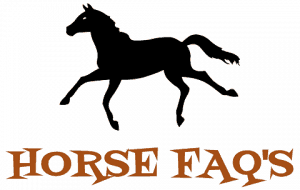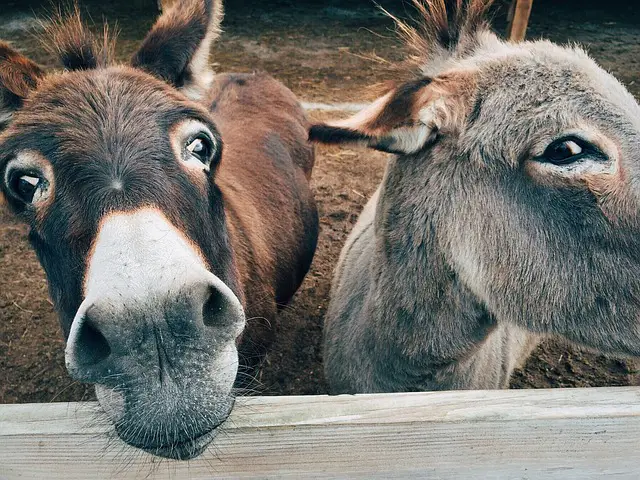Donkeys have been domesticated for thousands of years and have been used for various purposes, such as transportation, agriculture, and even as guard animals. Their territorial instincts and aggression towards perceived threats make them effective in deterring predators like coyotes, foxes, and wolves. Farmers and ranchers have been using donkeys as guard animals for their livestock, and the results have been impressive.
In this article, we will explore the abilities of donkeys as guard animals and their effectiveness against coyotes. We will delve into the scientific reasons behind their success, such as their size, territorial instincts, and behavior. Additionally, we will discuss how farmers and property owners can coexist with other animals while using donkeys as guard animals and the best practices for planning and introducing them to their properties.
By the end of this article, readers will have a better understanding of why donkeys are the coyote’s worst nightmare and why they make fantastic guard animals.
Guard Animal Abilities
The pre-existing knowledge suggests that donkeys possess impressive guard animal abilities, making them an effective deterrent against predators such as coyotes. Their territorial instincts are particularly noteworthy, as they become irritable when their territory is threatened. This instinctual need to protect their territory makes them an ideal guard animal.
Additionally, donkeys exhibit aggressive behavior towards perceived threats, using their teeth and hooves to push away predators. This aggressive behavior is a valuable asset to property owners who want to keep their animals safe from harm.
Furthermore, donkeys have excellent stamina and stay alert, making them good guard animals. Training techniques can further enhance their abilities, such as reinforcing their territorial instincts and teaching them to recognize and respond to potential threats. Donkeys can be trained to recognize specific smells or sounds associated with predators, allowing them to respond quickly and effectively.
Overall, the combination of their natural instincts and training techniques makes donkeys a formidable opponent for predators such as coyotes.
Effectiveness Against Coyotes
When considering the use of guard animals, research has shown that donkeys can be an effective deterrent against coyotes. Donkeys are imposing enough to deter all but the bravest of coyotes from coming close to your fences. Their strong territorial instincts and aggressive behavior make them ideal for keeping coyotes away.
Donkeys have fantastic stamina and stay alert, making them good guard animals. They also notice changes in the air and will sense when danger is near and move to head it off quickly. Donkeys will make a lot of noise to let strangers know they are there and move in the general direction of the threat to try and stop them from coming any closer.
Donkeys are known to be very effective in keeping coyotes away from livestock, especially when they are in groups. A standard donkey weighing around 500 pounds has been known to fight off coyotes to protect their territory. Donkeys have even been known to fight off bobcats. They use their teeth and hooves to go after any perceived threat and can kill a coyote if the fight goes on or is in close quarters.
Donkeys are also effective because they serve as an early warning system for farmers and other property owners who keep animals. Their loud braying scares away predators and alerts the owner to any danger. Overall, donkeys are an excellent choice for anyone looking for a reliable and efficient way to protect their livestock from coyotes.
Size Matters
Impressively, the weight and size of a guard animal can greatly impact its effectiveness in deterring potential predators.
When it comes to coyotes, mini donkeys may not be the best choice as guard animals due to their small size.
Standard donkeys, on the other hand, weigh around 500 pounds and are effective in keeping coyotes away.
Mammoth donkeys, which are as large as a horse, serve as a very effective deterrent against coyotes.
Coyotes are typically around 30-40 pounds, making them significantly smaller than standard and mammoth donkeys.
This size difference can be a major advantage for donkeys as they can use their size to intimidate and fight off coyotes.
In comparison, mini donkeys may not be able to physically defend themselves against coyotes, making them less effective as guard animals.
Therefore, when it comes to using donkeys as guard animals against coyotes, size does matter.
Territorial Instincts
Territorial instincts play a significant role in the effectiveness of guard animals in deterring potential predators. Donkeys are known for their strong territorial behavior, which makes them excellent guard animals against coyotes. They are very aggressive and will use their teeth and hooves to go after any perceived threat, making them a formidable opponent for predators. Donkeys have fantastic stamina and stay alert, making them good guard animals. They notice changes in the air and will sense when danger is near and move to head it off quickly.
Donkeys have a well-defined sense of territory and will protect their turf fiercely. They don’t react well to being in spaces with multiple other animals. It takes time and careful planning to introduce donkeys to one or two other animals. Donkeys will form strong bonds with other donkeys, but their introduction should be supervised to prevent any animals from getting hurt.
When grazing, donkeys are very good listeners and will react against a strange animal encroaching on their territory. Therefore, donkeys’ territorial behavior is one of their key features that make them the coyote’s worst nightmare.
Donkey Behavior and Reactions
Evidently, guard animals like donkeys have a well-defined sense of alertness, which allows them to quickly identify and react to potential threats. When grazing, donkeys are known for their attentive behavior and will often lift their heads to scan their surroundings. Donkeys also have a unique way of communicating with other animals through their braying, which is used to warn off predators and alert other donkeys of any potential danger.
In addition to their alertness and communication skills, donkeys also have distinct grazing habits. They are selective grazers, preferring to eat plants that are high in fiber and avoiding those that are low in nutrients. Donkeys also tend to graze for longer periods of time than other animals, allowing them to thoroughly explore their surroundings.
This grazing behavior can be beneficial for farmers and property owners, as donkeys will cover more ground and be more likely to detect any potential threats to their territory.
Coexisting with Other Animals
Coexistence with other animals is a crucial aspect to consider when keeping guard animals like donkeys on a property. Donkeys have strong territorial instincts and are known to be aggressive towards perceived threats. Therefore, it is important to carefully introduce donkeys to other animals in the enclosure or pasture to prevent any harm to other animals or the donkey itself.
Integrating donkeys with other animals may take a few weeks for the donkey to adjust to their new neighbors. Donkeys may treat dogs just like they would a coyote, so the introduction of dogs should be done with caution. Donkeys will bite and slash to push any perceived threat away, so it is important to supervise their introduction to prevent any animals from getting hurt.
With careful planning and supervision, donkeys can coexist with sheep, goats, and other animals in an enclosure or when they are out to pasture, and maintain good neighborly relations.
Planning and Introducing Donkeys
Continuing from our previous subtopic of coexisting with other animals, a crucial aspect of introducing donkeys to other animals is a gradual approach. Donkeys are known for their territorial instincts and aggressive behavior towards perceived threats. Therefore, introducing them to new animals should be supervised to prevent any harm to any of the animals involved.
To ensure a peaceful coexistence, it is essential to take a patient and consistent approach in donkey training. Donkeys take some time to adjust to new neighbors and may react aggressively towards dogs or other canines.
It is recommended to introduce them to one or two animals at a time and monitor their behavior closely. It may take a few weeks for them to calm down and accept their new friends. As we can see, introducing donkeys to other animals requires a careful and well-planned approach.
- Gradual approach to introducing donkeys to other animals
- Introduce one or two animals at a time
- Monitor behavior closely
- Supervised interaction
- Prevent harm to any animals involved
- Ensure peaceful coexistence
- Donkey training
- Patience and consistency
- Allow time for adjustment
- Monitor behavior closely
Summary and Conclusion
Donkeys are known to be territorial animals and have a reputation for being effective in keeping other animals away. Farmers and shepherds keep donkeys around to protect their livestock from predators like coyotes, foxes, and wolves. Donkeys have strong instincts to protect their territory and can become irritable when they feel threatened, making them an excellent protector for vulnerable animals such as sheep, chickens, and goats.
However, not all types of donkeys are suitable for the job. Mini donkeys are too small and vulnerable to be used as guard animals against coyotes. Standard donkeys, weighing around 500 pounds, and mammoth donkeys, as large as horses, are the most effective in deterring coyotes from coming close to fences. Donkeys are good at listening and can sense changes in the air, making them quick to head off any danger.
While donkeys are not trained to patrol pastures like guard dogs, they are great at monitoring what’s going on around them and braying loudly to push away predators. Donkeys are also very aggressive and can fight off small predators like coyotes, foxes, and even bobcats. If necessary, they can use their teeth and hooves to go after any perceived threat.
However, donkeys are territorial animals and do not do well around dogs or other canines. They need time to adjust to their new neighbors and may treat any strange dogs as they would a coyote. It is essential to introduce them slowly to keep everyone calm and avoid any incidents.
In conclusion, donkeys are great guard animals for keeping coyotes away. They have strong territorial instincts and can sense danger from afar. Farmers and shepherds can rely on them to protect their livestock from predators. However, it is essential to introduce them carefully to avoid any issues with other animals, especially dogs. Donkeys may be stubborn and irritable, but with proper care and attention, they can form strong bonds with their human owners and make excellent protectors for vulnerable animals.
Frequently Asked Questions
What is the average lifespan of a donkey?
Donkey breeding and nutrition are key factors in determining their lifespan, which can range from 25-30 years. Adopting an older donkey can have benefits such as already being trained and having a well-established personality.
Can donkeys be trained to perform tasks or tricks?
Donkeys can be trained to perform tasks and tricks through various donkey training techniques. They are used in the entertainment industry, but proper care and training is necessary to ensure their well-being and prevent exploitation.
What is the cost of owning and caring for a donkey?
The cost breakdown of owning and caring for a donkey includes expenses for shelter, food, veterinary care, and equipment. Donkeys require regular grooming, hoof trimming, and vaccinations. Care requirements may vary based on the age, breed, and health of the animal.
How do donkeys communicate with each other?
Donkeys communicate with each other through a variety of sounds, body language, and vocalizations. Communication methods in donkey herds are complex and often involve a mixture of vocalizations, postures, and movements. Donkeys are very good listeners when they’re grazing and react against a strange animal encroaching on their territory.
Are there any health concerns specific to donkeys that owners should be aware of?
Donkey health can be maintained with proper dietary needs, including hay, grazing, and access to clean water. Common ailments include dental problems, parasites, and hoof issues. Regular veterinary check-ups are recommended for optimal health.


